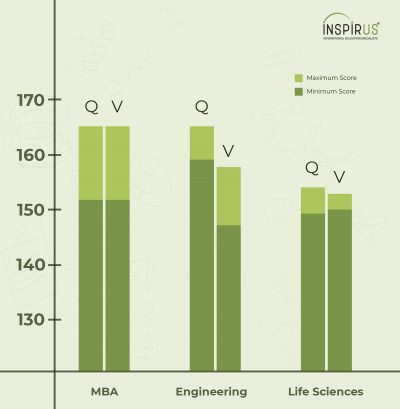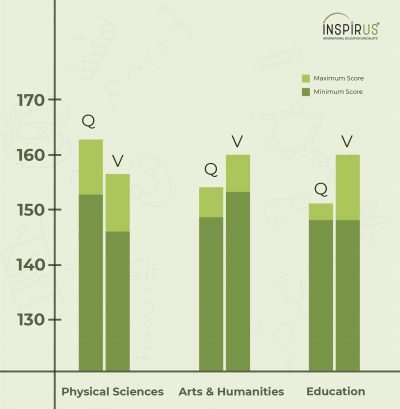In our earlier article about acing the Graduate Record Examination (GRE), we had provided some insights to help you crack the exam. In the last point, we stressed the importance of staying positive and having a target score in mind. But, how does one determine a target score? What is a good GRE score? In this article, we will look at some tips to help you determine the target GRE score.
The GRE is one of the most competitive exams taken by aspirants from all over the world for various programs. In order to secure admission in a good university, you need to set a target score for yourself. Let’s take a look at how you can do it:
Table Of Contents
- What is a Good GRE Score For You?
- Guide to GRE Scores
- The University’s Perspective – Good GRE Score
- Good GRE Score For
- The Percentile Concept
- One Size Does Not Fit All
- Some Number Crunching
- Before We Sign Off
- Universities that accept GRE score of 300 to 310
- Universities that accept GRE score of 310 to 320
- Universities that accept GRE score of 320 to 340
A ‘good GRE score’ can vary from person to person and also from university to university. For some students, 310 can be a good score while others may not find 310 a good enough score. Although it is difficult to perfectly answer the question, here are some points that can be considered to determine what classifies as a good GRE score for you.
- List down the universities that you are interested in applying to.
- Take a look at those universities’ average GRE scores.
- Most universities take a look at your verbal and quant scores individually rather than the total score. Universities will pay more attention to your verbal score if you are applying for humanities programs and to your quants section if you are applying for science or maths programs. So, concentrate on your scores depending upon the kind of program that you aspire to pursue.
- Aim to score at least two points above the highest score after you have shortlisted the universities’ average scores. The higher you are able to score, the better it is.
- There you go, you have your goal score!
Great GRE scores also play an important role when universities determine your candidature for granting scholarships or financial aid.
Guide to GRE Scores:
| Sections | Score Ranges |
| Verbal Reasoning | 130-170, 1 point increments |
| Quantitative Reasoning | 130-170, 1 point increments |
| Analytical Writing | 0-6, 0.5 point increments |
Remember we said that you must take your target universities/ field into consideration before determining your target GRE score? Well, the good news is that most universities publish the average scores of their incoming class on their website every year. You can leverage this information to analyze what range you would want to target.
Another important aspect that you should keep in mind is the percentile approach of universities. Being a competitive exam, the score alone is not an indicator of your performance. It is the comparison with other test takers that determines your eligibility. To bring things into perspective, the 80th percentile is considered to be a good score by the top 30 U.S. universities.
Important: While an 80th percentile can put you in a place where your application can be considered for admission, it is not the only parameter.
Also Read: How to ace the GRE

Here are some good scores for particular fields to give you an idea about the score you should aim depending upon the field you wish to pursue.
Analytical Writing:
The analytical writing score is calculated separately from the quants and verbal section and the maximum score can be 6. A minimum score of 4 can be considered as a good enough score in analytical writing.
MBA:
Are you planning to pursue your MBA abroad? Different B schools accept different GRE scores. However, to get admission into top B schools in the US, you need to score a minimum of 320. However, for anyone aspiring to take admission to Ivy League colleges, a score of minimum 330 should be good enough.
MS:
A total score of 325 and above should help you to get admission into the topmost colleges. However, even a score above 300 is good enough for MS.
Nursing:
A score ranging between 305 and 316 can be considered a good GRE score for anyone who wants to take admission in nursing.
Engineering:
Universities will pay more attention to your Quants score as compared to your Verbal scores. If you wish to pursue an Engineering degree, aiming for at least 160 on the Quants section should be good enough. However, if you aim to take admission to the topmost colleges, you need to aim for at least 166.
Ph.D.:
Again, this depends on a lot of factors. But, a score of around 310 should be good enough for taking admission into a PhD course.
To Get A Scholarship:
Getting a scholarship does not solely depend upon your GRE scores. However, good GRE scores will surely help. Aim for a score higher than the average scores of the university that you are applying to. And that, along with other factors should be enough to get you a scholarship.
Below are the minimum and maximum GRE score ranges for various fields:
In the images, we have depicted the minimum and maximum GRE score ranges for particular fields. For example, if you wish to appear GRE for MBA the minimum and maximum Quants score that you need is 152 and 165 respectively. Similarly, for MBA, the minimum and maximum Verbal score required is 152 and 165 respectively.
Another important aspect that you should keep in mind is the percentile approach of universities. The percentile is a concept that determines what percent of all GRE test takers did you score better than. So, if your score falls in the 25th percentile, it means that you scored better than 25% of all test takers.
A score of 150 on verbal and 152.6 on Quants is considered as the average score or 50th percentile score. The average score for the analytical writing section is 3.5. The Quant scores generally tend to be higher than the Verbal scores. For example, a score of 165 is 96th percentile for verbal whereas, this same score is 89th percentile for quants.
So, anything that is above the average of the 50th percentile can be considered as a better than average score. However, to get a ‘good’ score, you can aim for at least the 75th percentile.
Being a competitive exam, the score alone is not an indicator of your performance. It is the comparison with other test takers that determines your eligibility. To bring things into perspective, the 80th percentile is an accepted score by the top 30 U.S. universities.
Important: While an 80th percentile can put you in a place where your application can be considered for admission, it is not the only parameter.
You can use the table below to get an idea of what percentile your score lies in:
|
GRE Score |
Quant Percentile | Verbal Percentile |
|
170 |
97 |
99 |
|
169 |
96 | 99 |
|
168 |
94 | 98 |
| 167 | 92 |
98 |
|
166 |
91 | 97 |
| 165 | 89 |
96 |
|
164 |
87 | 94 |
| 163 | 84 |
93 |
| 162 | 81 |
91 |
|
161 |
78 | 88 |
| 160 | 76 |
86 |
|
159 |
73 | 83 |
| 158 | 69 |
80 |
|
157 |
66 |
76 |
|
156 |
62 |
73 |
|
155 |
59 |
69 |
|
154 |
55 | 65 |
|
153 |
51 | 61 |
|
152 |
47 | 56 |
| 151 | 43 |
52 |
|
150 |
38 | 48 |
|
149 |
35 |
43 |
| 148 | 30 |
39 |
| 147 | 27 |
35 |
|
146 |
24 | 31 |
| 145 | 21 |
27 |
|
144 |
17 |
24 |
| 143 | 14 |
20 |
|
142 |
12 |
17 |
|
141 |
10 |
15 |
|
140 |
8 | 12 |
|
139 |
6 |
9 |
|
138 |
4 | 8 |
|
137 |
3 |
6 |
|
136 |
2 | 4 |
| 135 | 2 |
3 |
|
134 |
1 |
2 |
|
133 |
1 |
2 |
|
132 |
– |
1 |
|
131 |
– |
1 |
| 130 | – | – |
As a student aspiring to bag a seat with most of the graduate programs at US universities, scoring well at the GRE is a must. Before you set about creating a target score based on hearsay, it is important to understand that different universities have different GRE score benchmarks. These benchmarks can also vary between different departments in the same university. The GRE tests your verbal and quantitative reasoning abilities along with critical thinking and analytical writing skills. Depending on the course, the university/ department might peg more importance on the scores of certain sections.
In simple words, the qualifying ranges for admission to Stanford will be different from those for MIT. Hence, you need to assess the GRE requirements of your target universities before determining the target score.
As per ETS, the GRE administrator, the average scores of a GRE applicant are:
- Quantitative Reasoning – approximate average score of 151 with a standard deviation of 8.4
- Verbal Reasoning – an approximate average of 153 with a standard deviation of 9.1
So, what does this mean? In simple words, if you score more than 304 (151 + 153), then you are better than half the GRE takers in the world.
But, is it good enough? No, but if you add the standard deviations to the average scores you get a composite score of 321.5. This score means that you are better than 80% of the GRE takers worldwide (around the 80th percentile). That certainly is a good score.
Remember, these average scores are across all programs. You can refer to the list of graduate programs with their respective average GRE score and calculate your target score accordingly.
Bagging a seat with your dream university requires a lot of preparation. Also, as all preparations go, the best place to start is by planning it in advance. After setting realistic and achievable targets, you can work on a study plan that can help you achieve it. Reputed GRE coaching classes offer guidance to help you determine a good GRE score.
Did you know that our student Ashwini Nene scored a perfect 340/340 on the GRE? Here is an interview with her, where shares her tips and tricks to ace the GRE.
We at Inspirus Education, have specialized GRE faculty, offering a personalized study plan for every student and a mentor to guide you. Our approach and mentoring have been showing excellent results for our students. Our Alumni are currently learning at Stanford, Purdue, CMU, Georgia Tech, and many other Ivy League Universities.
What is a bad GRE score?
‘Bad’ can be a relative term. However, put in simple words, a score that doesn’t get you admitted to the university of your dreams can be termed as a bad score.
Is 330 a good GRE score?
330 is definitely a good enough score to get you admitted to top universities provided that you have a strong overall profile, LORs, and SOPs.
Universities that accept GRE score of 300 to 310:
Here, we bring to you a list of universities that accept a GRE score between 300 and 310.
- Illinois Institute of Technology (Chicago, Illinois)
- University of Alabama (Huntsville, Alabama)
- Missouri State University (Springfield, Missouri)
- University of Pittsburgh (Pittsburgh, Pennsylvania)
- University of Central Florida (Orlando, Florida)
- Kansas State University (Manhattan, Kansas)
- Wayne State University (Detroit, Michigan)
- University of Tampa (Tampa, Florida)
- Wright State University (Dayton, Ohio)
- Florida State University (Tallahassee, Florida)
Universities that accept GRE score of 310 to 320:
- Arizona State University (Tempe, Arizona)
- Ohio State University (Columbus, Ohio)
- University of Colorado (Boulder, Colorado)
- North Carolina State University (Raleigh, North Carolina)
- Pennsylvania State University (Centre County, Pennsylvania)
- State University of New York (Buffalo, New York)
- University of South Carolina (Columbia, South Carolina)
- University of Rochester (Monroe County, Rochester)
- Vanderbilt University (Nashville, Tennessee)
- Indiana University Bloomington (Bloomington, Indiana)
Universities that accept GRE score of 320 to 340:
- Massachusetts Institute of Technology (Cambridge, Massachusetts)
- Carnegie Mellon University (Pittsburgh, Pennsylvania)
- University of Texas at Austin (Austin, Texas)
- Harvard University (Boston, Massachusetts)
- Purdue University (West Lafayette, Indiana)
- Stanford University (Stanford, California)
- Princeton University (Princeton, New Jersey)
- University of California at Berkeley (Berkeley, California)
- Texas A&M University (College Station, Texas)
- Duke University (Durham, North Carolina)
- Columbia University (New York City, New York)
- Yale University (New Haven, Connecticut)
- Johns Hopkins University (Baltimore, Maryland)
- Duke University (Durham, North Carolina)
- Brown University (Providence, Rhode Island)
And many more..
However, you must keep in mind that to be able to get admitted to these universities; along with a good GRE score, you must also have a great overall profile along with strong SOPs and LORs.
Remember, dreams can be fulfilled. All they need is the fuel of a good plan and hard work. All the best!
Also Read: 5 important pointers to help you improve your GRE profile
References:
- https://onlinelibrary.wiley.com/doi/abs/10.1002/j.2333-8504.1995.tb01655.x
- http://bulletin.binghamton.edu/grad-school/docs-forms/annual-report/docs/2004-2005/Test%20Scores.pdf
- https://journals.sagepub.com/doi/abs/10.1177/001316446302300219?journalCode=epma
- https://onlinelibrary.wiley.com/doi/abs/10.1002/j.2330-8516.1986.tb00199.x




